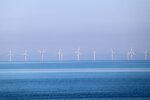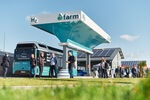News Release from Siemens Gamesa Renewable Energy
Wind Industry Profile of
06/14/2008
Turkey - Siemens eyes to invest in Turkish wind energy market
Siemens Turkey CEO Hüseyin Gelis and Wolfgang Dehen, a board member and the company's energy division CEO, expressed their strong will to invest in the Turkish wind energy business in particular at a roundtable with members of the press in İstanbul on Tuesday.
"We see a huge market of opportunities in Turkey's energy sector. And we strongly wish to invest in this market!" Dehen said.
"Turkey is among the world's top five fastest growing countries and is currently the 17th most important economic power of the world, with the potential to move up to 15th place in 2008," Dehen said, explaining that these growth rates will naturally be reflected by a rapidly increasing demand for energy in the future.
Renewable energy sources, he underlined, will therefore play a very important role in the future. He expects that in 2030 a significant part of energy supply will be covered by renewable energy sources and noted that Siemens wants to address this challenge by investing in the wind energy business in particular. Siemens is a flagship company in the wind energy business.
Wind energy most promising
"We need good and fast solutions," he said, noting that wind energy still remains the one energy source that can be harnessed in a relatively short amount of time. While it takes around five years to bring a nuclear power plant into service and two to three years for a natural gas power plant, a wind park can be built in just 15 to 18 months, he explained, adding that Turkey, with its vast coastal regions, has the most suitable weather conditions. "We, as Siemens, can contribute to that with the newest technology. Our know-how is what we are renowned for," he pointed out. Indeed, in the rapidly growing global wind power market, Siemens' energy division not only builds off and onshore wind farms, it also ensures that they are efficiently linked to power grids.
However, nothing has yet been decided, and the company is currently searching for project partners. "We are also here to make our customers stronger," Dehen said. CEO Gelis noted that in this regard a restructuring program launched by Siemens last year has been of great importance. As of January 2008 Siemens reorganized its operations in three sectors: industry, energy and healthcare. "The new and clearer distribution of responsibilities makes us much stronger and ensures that we are much faster, with a helping hand extended to our customers and their needs," Gelis underlined.
Public-private partnerships (PPP) may play a role in the search for project partners. "We carried out PPPs in markets abroad and have come away with very positive experiences," Gelis said. When asked what he thought about a recent government decision to build nuclear power plants, he declined to comment. "Nuclear power is a viable part of a country's desired energy mix. Turkey has a very diverse portfolio and, generally, it is correct to also focus on more than one area."
Siemens' energy division covers the whole spectrum of offerings, ranging from solutions for the oil and gas industry to products and solutions for the generation, transmission and distribution of electrical energy. This makes Siemens' energy division the world's only manufacturer with comprehensive know-how along the entire chain of energy conversion, particularly regarding interfaces such as between power plants and grids.
The new Siemens' energy division currently has some 71,000 employees and posted revenue of nearly 20 billion euros in fiscal 2007. Since the overall energy market is projected to grow 11 percent annually up to 2010, Siemens estimates that the total volume of the market in 2010 will be substantially over 300 billion euros
"We see a huge market of opportunities in Turkey's energy sector. And we strongly wish to invest in this market!" Dehen said.
"Turkey is among the world's top five fastest growing countries and is currently the 17th most important economic power of the world, with the potential to move up to 15th place in 2008," Dehen said, explaining that these growth rates will naturally be reflected by a rapidly increasing demand for energy in the future.
Renewable energy sources, he underlined, will therefore play a very important role in the future. He expects that in 2030 a significant part of energy supply will be covered by renewable energy sources and noted that Siemens wants to address this challenge by investing in the wind energy business in particular. Siemens is a flagship company in the wind energy business.
Wind energy most promising
"We need good and fast solutions," he said, noting that wind energy still remains the one energy source that can be harnessed in a relatively short amount of time. While it takes around five years to bring a nuclear power plant into service and two to three years for a natural gas power plant, a wind park can be built in just 15 to 18 months, he explained, adding that Turkey, with its vast coastal regions, has the most suitable weather conditions. "We, as Siemens, can contribute to that with the newest technology. Our know-how is what we are renowned for," he pointed out. Indeed, in the rapidly growing global wind power market, Siemens' energy division not only builds off and onshore wind farms, it also ensures that they are efficiently linked to power grids.
However, nothing has yet been decided, and the company is currently searching for project partners. "We are also here to make our customers stronger," Dehen said. CEO Gelis noted that in this regard a restructuring program launched by Siemens last year has been of great importance. As of January 2008 Siemens reorganized its operations in three sectors: industry, energy and healthcare. "The new and clearer distribution of responsibilities makes us much stronger and ensures that we are much faster, with a helping hand extended to our customers and their needs," Gelis underlined.
Public-private partnerships (PPP) may play a role in the search for project partners. "We carried out PPPs in markets abroad and have come away with very positive experiences," Gelis said. When asked what he thought about a recent government decision to build nuclear power plants, he declined to comment. "Nuclear power is a viable part of a country's desired energy mix. Turkey has a very diverse portfolio and, generally, it is correct to also focus on more than one area."
Siemens' energy division covers the whole spectrum of offerings, ranging from solutions for the oil and gas industry to products and solutions for the generation, transmission and distribution of electrical energy. This makes Siemens' energy division the world's only manufacturer with comprehensive know-how along the entire chain of energy conversion, particularly regarding interfaces such as between power plants and grids.
The new Siemens' energy division currently has some 71,000 employees and posted revenue of nearly 20 billion euros in fiscal 2007. Since the overall energy market is projected to grow 11 percent annually up to 2010, Siemens estimates that the total volume of the market in 2010 will be substantially over 300 billion euros
- Source:
- Siemens Wind Power GmbH
- Author:
- Edited by Trevor Sievert, Online Editorial Journalist / Author: Siemens Energy Staff
- Email:
- support.energy@siemens.com
- Link:
- www.siemens.com/...
- Keywords:
- wind energy, wind farm, renewable energy, wind power, wind turbine, rotorblade, offshore, onshore



























